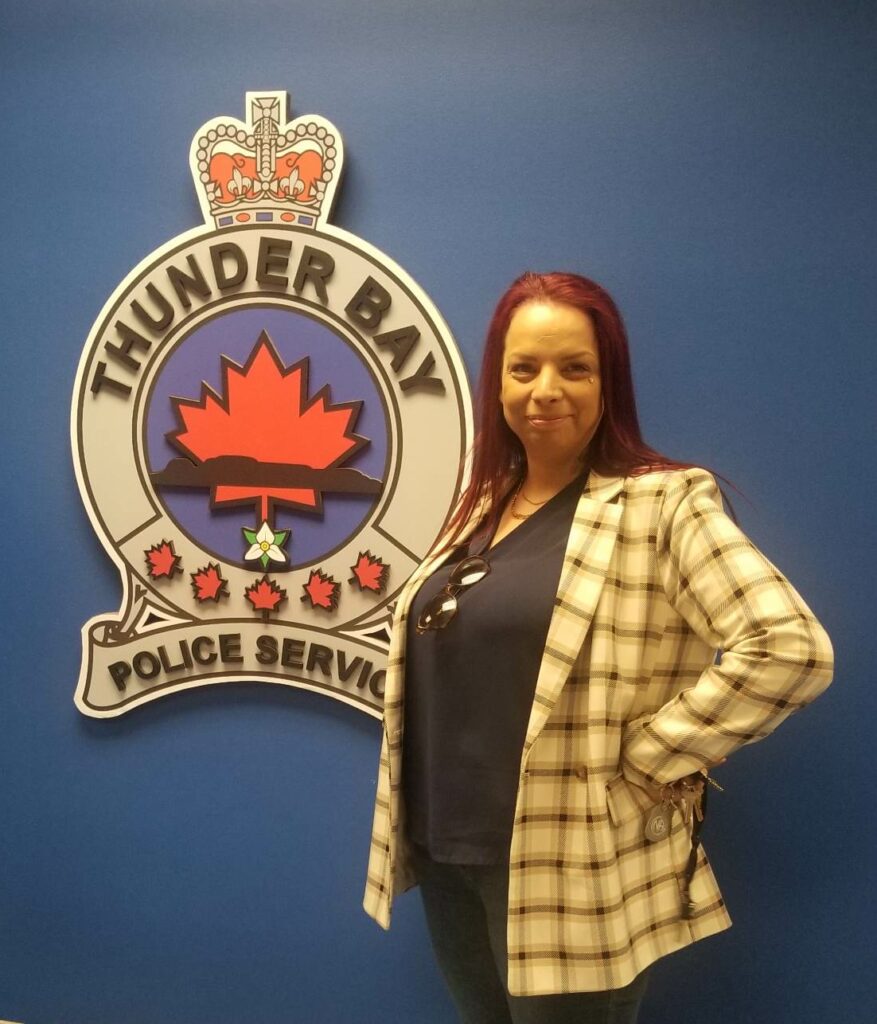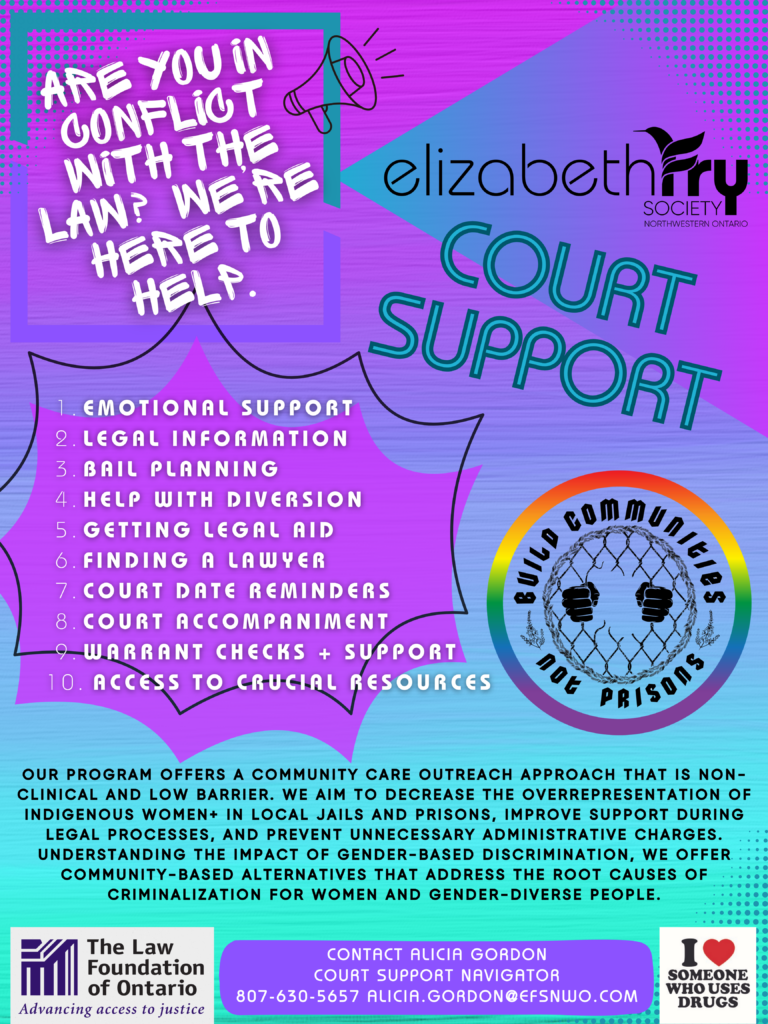Court Support
The Elizabeth Fry Society of Northwestern Ontario’s Court Support Program uses a comprehensive approach to assist individuals in the legal system. This includes proactive outreach and prevention of administrative charges through court docket surveys, is low-barrier, uses gendered approaches, and collaboration with community partners. The program also focuses on safety planning and individual advocacy, communication with legal representatives, a continuum of services connecting individuals with resources, court navigation, and family reunification efforts.
Strategies to reduce recidivism involve positive community connections and collaboration with organizations addressing the root causes of criminalization. The program applies trauma-informed and culturally sensitive practices, offers assistance with legal aid and representation, promotes knowledge and empowerment, and recognizes historical gender disparities in the legal system. Advocacy efforts extend to addressing the gendered nature of violence, understanding trauma’s impact, and advocating for marginalized communities. Overall, the program aims for systemic change and decriminalization, particularly the over-incarceration of Indigenous women and humans rights issues faced by 2SLGBTQIA+ individuals in incarcerated spaces.
The EFSNWO Court Support Program addresses the specific needs of women and gender-diverse individuals who often fall through the cracks of existing support systems. It is the only court support program in the community that is specifically made by and for women and gender-diverse people, recognizing the complexities in how women+ enter the criminal justice system. It is low-barrier and is made specifically for vulnerable individuals who often cannot access traditional services.

In Photo: Alicia Gordon, Court Support Navigator | EFSNWO
We offer a unique and unconventional approach to court support that involves a component of outreach. The Court Support Navigator reaches out to individuals seen on the dockets to offer support. When needed, we utilize community partner organizations to assist with contacting the individual in cases where they are living transiently. We also have a dedicated team of front-line staff who assist with connecting.
We decided to take this approach upon seeing the disproportionate amount of administrative charges on women and gender-diverse people in the community; a signal of systemic failures. This approach has proven to be remarkably effective in preventing and reducing administrative charges, such as failures to appear, by offering community support. By intervening at this crucial juncture, we are addressing systemic issues within the legal process that disproportionately affect vulnerable individuals. Crimes of survival are the main factor in charges for women and gender-diverse individuals. EFSNWO has the opportunity to collaborate with other agencies to work on the decriminalization of this population, acting as a tool of change in addition to providing service.
Important Note: The program does not offer legal advice and is not a substitute for advice from a lawyer.
Court Support Program Goals and Objectives
1. Proactive Outreach and Preventing Admin Costs
- Regular surveys of court dockets to identify individuals in need.
- Proactive outreach to offer assistance and guidance.
- Providing information on court dates, processes, and legal obligations.
- Operates with a low-barrier, culturally sensitive, and gendered approach.
- Collaborates with community partners and a dedicated front-line staff for enhanced outreach efforts.
2. Safety Planning and Individual Advocacy
- Collaboration with individuals for safety plans, especially in cases of domestic violence.
- Personalized advocacy within the legal system, addressing individual needs.
3. Communication with Lawyers and Duty Counsel
- Liaison with legal representatives to coordinate support.
- Facilitation of effective communication between participants and lawyers.
4. Continuum of Services and Community Connection
- Connect participants with mental health support, housing resources, and substance use health treatment.
- Facilitate engagement with community organizations and support networks.
5. Court Navigation and Reunification
- Offer emotional support, safety planning, legal information, court accompaniment, and access to crucial resources.
- Assistance in preparing legal documents and working towards reunification of mothers with their children and families.
6. Reducing Recidivism and Local Incarceration Rates
- Provide access to positive community connections to prevent recividism.
- Collaborate with organizations in addressing the root causes of criminalization, specifically as it pertains to women and gender-diverse people (ie., crimes of survival, the criminalization of poverty, etc).
7. Trauma-Informed and Culturally Sensitive Approach
- Apply trauma-informed and culturally sensitive practices to all interactions.
- Recognize and address unique needs and challenges faced by different groups.
8. Assistance with Legal Aid and Representation
- Help individuals navigate legal aid processes and connect with representation.
- Provide guidance on accessing legal resources and support.
9. Promoting Knowledge and Empowerment
- Detailed information on legal rights, responsibilities, and potential outcomes.
- Empower individuals with enhanced legal literacy and understanding.
10. Gender-Specific Approach
- Recognize historical gender disparities in the legal system leading to discrimination and violence against women and gender-diverse individuals.
- Tailor services based on a gendered-lens approach, addressing unique needs and experiences.
11. Advocating for Marginalized Communities
- Recognize and address the gendered nature of violence against women+.
- Understand the impact of trauma on survivors.
- Advocate for the rights and needs of marginalized communities.
12. Overall Impact and Systemic Change
- Recognize the disproportionate impact of administrative charges on vulnerable individuals.
- Aim to contribute to broader systemic change, including the decriminalization of the served population.
Contact Information:
Alicia Gordon
EFSNWO Court Support Navigator
807-630-5657
alicia.gordon@efsnwo.com
Generously funded by:


